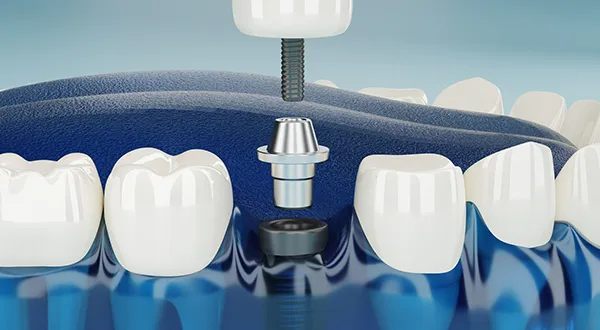Getting Dental Implants for People with Gum Problems
Dental Implants Solutions
Do you have periodontal disease and wonder if dental implants are still an option? Even though gum disease can damage the gums and bone supporting your teeth, dental implants can still work for many patients with periodontal disease. Properly managing and treating your gum disease can increase your possibility of a successful dental implant placement.
In this blog post, we'll explore everything you need about dental implants for patients with periodontal disease. We'll cover the impact of gum disease on dental implant candidacy and how to prepare for implant surgery. And tips for caring for your dental implants if you have periodontal disease.
What is periodontal disease, and how does it affect dental implant candidacy?
Periodontal disease (gum disease) is a bacterial infection that impacts the gums and the bone that holds the teeth in place. The early stage of gum disease, known as gingivitis, can result in inflamed, red gums that bleed easily. Without proper treatment, gum disease can advance to periodontitis. This condition leads to gum recession, the development of pockets between the teeth and gums, and the decay of the bone and connective tissue that support the teeth.
The damage caused by periodontal disease can affect dental implant candidacy in a few ways:
- If the disease has caused significant bone loss in the jaw, there might not be enough bone to support a dental implant.
- Gum disease can compromise the healing process after implant surgery, increasing the threat of implant failure.
- Gum disease can raise the risk of infection around the implant, leading to further complications.
However, with proper management and treatment of gum disease, many patients can still be good candidates for dental implants. Your dentist or periodontist can examine your dental health and decide if you are a good candidate for dental implant surgery. They may recommend periodontal treatment, such as scaling and root planing or gum surgery, to manage your gum disease and improve your chances of successful implant placement.
The importance of periodontal disease management before undergoing dental implant surgery
- Managing periodontal disease before implant surgery is important if you're considering dental implants. Periodontal disease can cause harm to the gums and bones that support your teeth, which can compromise the success of implant placement.
- Before dental implant surgery, your dentist or periodontist will evaluate your oral health to determine signs of gum disease. They may recommend periodontal treatment before implant surgery if you have gum disease. This may include scaling and root planning, gum surgery, or other procedures to manage the infection and promote healing.

- Proper management of gum disease is important because it can help ensure the success of implant placement. If you have gum disease, it can decrease the healing process after implant surgery. Moreover, it increases the risk of implant failure. Treating the infection before implant surgery can improve your chances of successful implant placement and reduce the risk of complications.
- Managing your gum disease can improve your oral health and lessen your risk of future dental problems. By maintaining healthy gums and bones, you can boost the longevity of your dental implants.
Can patients with periodontal disease still receive dental implants?
Yes, patients with periodontal disease can still receive dental implants in many cases. However, the severity of the periodontal disease and the amount of bone loss in the jaw can affect the success of implant placement.
Before implant surgery, your dentist or periodontist will assess your dental health to decide if you are a good candidate for dental implants. If you have periodontal disease, they may recommend scaling and root planing or gum surgery to manage the infection and improve the health of your gums and bones.
If you have significant bone loss in the jaw due to periodontal disease, your dentist or periodontist may recommend a bone grafting procedure to increase the amount of bone available to support the dental implant. This procedure involves taking bone from another part of your body or using synthetic bone material to build up the jawbone.
The impact of periodontal disease on dental implant success rates
Periodontal disease can significantly impact the success rates of dental implant surgery. The damage caused by periodontal disease can affect the implant's stability and increase the risk of implant failure.
The most significant factor in the success of dental implant surgery is the amount of bone available to support the implant. If there is not enough bone to support the implant, the implant may not integrate properly with the bone and may become loose or fail altogether. Periodontal disease can result in bone loss in the jaw, reducing the amount of bone available for implant placement.
The bacteria that lead to periodontal disease can also infect the area around the implant, leading to inflammation and other complications. Additionally, gum disease can compromise the healing process after implant surgery. If the dental implant does not integrate properly with the bone during the healing process, it may fail and need removal.
Studies have shown that people with periodontal disease risk implant failure more than those without. However, dental implant surgery success rates can still be high with proper disease management, including periodontal treatment and good oral hygiene.
The role of bone grafting in dental implant placement for patients with periodontal disease
Patients with periodontal disease may have insufficient jawbones to support implants. This is because periodontal disease can cause bone loss in the jaw, making it challenging to place implants securely.
Bone grafting is a standard procedure to increase bone availability for implant placement. This procedure involves taking bone from another part of the patient's body, using synthetic bone material, or using bone from a donor to build up the jawbone. The grafted bone then integrates with the patient's natural bone, providing a solid foundation for implant placement.
Patients with periodontal disease may require bone grafting before undergoing dental implant surgery. This is because the bone loss associated with periodontal disease can make it difficult to place implants securely. Bone grafting can help to rebuild the jawbone and provide a foundation for the implant.
A Periodontist or an oral surgeon typically performs the bone grafting procedure. The grafting material is placed where the bone loss has occurred and then covered with a protective membrane or tissue to allow for healing. The method may use local anesthesia or sedation to ensure the patient's comfort.
After the bone grafting procedure, the patient must wait a few months for the new bone to integrate with their natural bone. The patient can undergo dental implant surgery once the new bone has healed and integrated.
The benefits of dental implants for patients with periodontal disease
- Preserve Jawbone Density:
Dental implants help maintain the density of the jawbone by stimulating the bone. This stimulation helps prevent further bone loss, common in patients with periodontal disease. Dental implants can help maintain the jaw's structural integrity and prevent other tooth loss by preserving jawbone density.

- Improves Chewing Function:
Patients with periodontal disease may have difficulty chewing and eating certain foods. Dental implants provide replacement teeth, allowing patients to chew and eat more comfortably and confidently. This can improve overall nutrition and quality of life.
- Enhances Aesthetics:
Missing teeth and gum recession impact the appearance of a patient's smile. Dental implants can improve the smile's aesthetics by replacing missing teeth and supporting the surrounding gum tissue. Moreover, dental implants can improve self-confidence and overall quality of life.
- Long-Term Solution:
Dental implants are a lifelong solution for tooth replacement, with a success rate of up to 98%. Patients with periodontal disease can benefit from dental implants for many years without frequent replacements or repairs.
How do you care for dental implants if you have periodontal disease?
- Brush and Floss Regularly
Proper oral hygiene determines the success of dental implants. Patients with periodontal disease are at more threat of implant failure. Therefore, it's essential to maintain a rigorous oral hygiene routine. Brush daily with a soft-bristled brush. Moreover, it is important to floss daily to remove plaque and bacteria from the implant.
- Use Antibacterial Mouthwash
Patients with periodontal disease may have a higher risk of implant failure due to bacterial infections. Therefore, using an antibacterial mouthwash can help reduce the infection risk and promote healing. Consult your dentist or periodontist to determine the best mouthwash for your needs.
- Visit Your Dentist Regularly
Regular dental check-ups are essential for patients with dental implants and periodontal disease. Your periodontist can monitor the health of your implant and surrounding gums and detect any potential issues early on.
- Avoid Smoking
Smoking can negatively affect your gums' health and increase the risk of implant failure. If you have periodontal disease, it's recommended that you quit smoking to lower the risk of complications.
- Eat a Healthy Diet
A balanced diet containing vitamins and minerals can promote healing and improve the success rate of dental implants. Patients with periodontal disease should also limit their intake of sugary and acidic foods to lower the risk of decay and gum disease.
Conclusion
To sum up, preventing periodontal disease from affecting your dental implants is important for their long-term success. Maintaining good oral hygiene, visiting your dentist regularly, quitting smoking, following a healthy diet, and managing chronic health conditions can reduce your risk of developing periodontal disease and improve your oral health. If you have a history of periodontal disease, working closely with your dentist or periodontist is essential to ensure your dental implants remain healthy and functional. Remember, prevention is critical regarding periodontal disease and dental implant success.
Contact your Walnut Creek dentist, Dr Massood Darvishzadeh, DDS at Dental Implant Solutions, to learn more about Getting Dental Implants for People with Gum Problems.
Resource:
Tips and Special Considerations for Dental Care in Elderly People
*This media/content or any other on this website does not prescribe, recommend, or prevent any treatment or procedure. Therefore, we highly recommend that you get the advice of a qualified dentist or other medical practitioners regarding your specific dental condition*
Subscribe To Our Newsletter
Get Updates And Learn From The Best
More To Explore



CONTACT US
Massood Darvishzadeh, DDS
2021 Mt Diablo Blvd., Suite 100A
Walnut Creek, CA 94596
(925) 939-2600info@dentalimplantsolutions.net